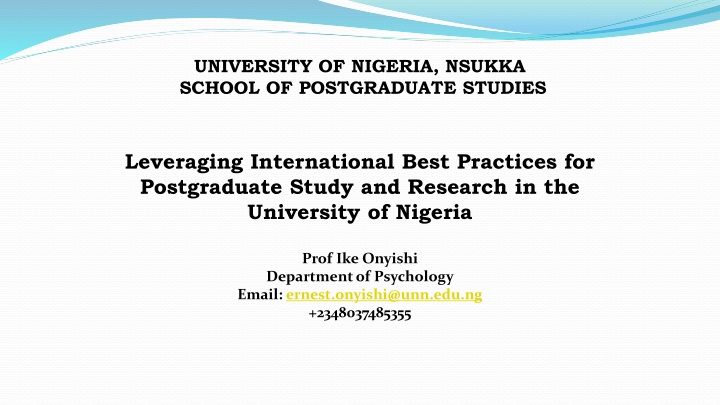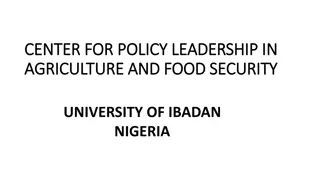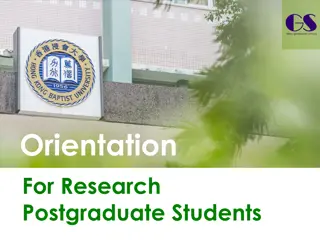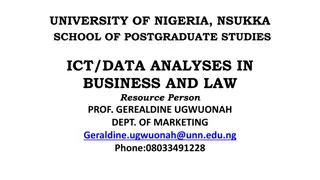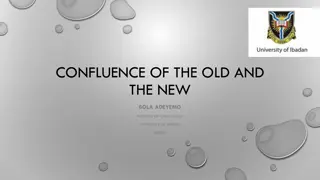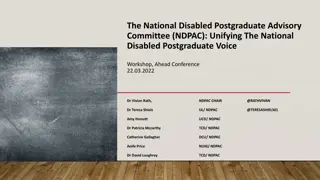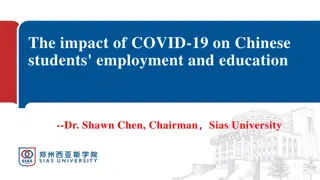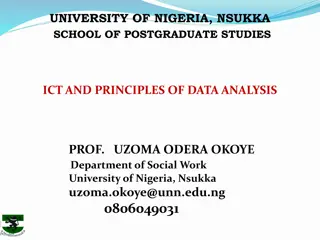Best Practices for Postgraduate Studies at University of Nigeria, Nsukka
Explore the postgraduate programs at the University of Nigeria, Nsukka, emphasizing key aspects like initiating a program, mentorship by supervisors, research ethics, conference attendance, and publishing guidelines. It also highlights desirable attitudes for postgraduate students and the essential role of mentors in academic success.
Download Presentation

Please find below an Image/Link to download the presentation.
The content on the website is provided AS IS for your information and personal use only. It may not be sold, licensed, or shared on other websites without obtaining consent from the author.If you encounter any issues during the download, it is possible that the publisher has removed the file from their server.
You are allowed to download the files provided on this website for personal or commercial use, subject to the condition that they are used lawfully. All files are the property of their respective owners.
The content on the website is provided AS IS for your information and personal use only. It may not be sold, licensed, or shared on other websites without obtaining consent from the author.
E N D
Presentation Transcript
UNIVERSITY OF NIGERIA, NSUKKA SCHOOL OF POSTGRADUATE STUDIES Leveraging International Best Practices for Postgraduate Study and Research in the University of Nigeria Prof Ike Onyishi Department of Psychology Email: ernest.onyishi@unn.edu.ng +2348037485355
OUTLINE Starting a Postgraduate Programme at the University of Nigeria, Nsukka Supervisors as mentors Conducting Postgraduate Research The Issue of Ethics Conference Attendance as a Postgraduate Student Publishing with your supervisor(s) and others
Postgraduate Programme at the University of Nigeria, Nsukka* All programmes will involve both course work and research project All postgraduate students are expected to: spend a minimum of three semesters (master s programme) or eight semesters (PhD) attend at least 70% of the required lectures/seminars submit a completed research work at the end of their programmes PhD students are required to attend conferences before they are allowed to sit for final examination. (*For details see: Postgraduate Studies Regulation, University of Nigeria, Nsukka)
Desirable Positive Attitudes of Postgraduate Students Inquisit iveness Resilience Enthusiastic Innovation Realistic Openess to Feedback Multimethods Quality Relationship with Supervisors and others Creativity Painstaking Love of Books Proactiveness 4
Desirable Attitudes Above all, keep busy ..
Mentorship: Supervisors as Mentors Choosing your career path is a difficult one. Doing it on your own is even more so. Having someone to talk to and share your concerns/challenges/ideas with can be extremely beneficial (Gould, 2014).
Role of Mentors Who is a Mentor? "Mentoring is to support and encourage people to manage their own learning in order that they may maximise their potential, develop their skills, improve their performance and become the person they want to be." Eric Parsloe A mentor helps the mentee to find the right direction and develop solutions to academic issues. In our academic careers we typically have several options but choosing from the available options could as well be tasking. Leveraging on their own experiences, mentors can help mentees to navigate through this challenges.
Role of Mentees You have to allow yourself to be mentored. In as much as I agree that we may have few senior academics here that would have deliberate plans to mentor the younger ones, most often we do not allow ourselves to be mentored. We want to be the boss at the very beginning of our programmes. Yes, you can become the boss now, but it has its own implications. In the Igbo adage, it is said that it is the responsibility of a child that is being fed to bring his or mouth closer. I am sure that no one is more interested in your academics than yourself.
Conducting Postgraduate Research The Issue of Ethics Ethics is concerned with systematically understanding, analysing and distinguishing between bad (wrong) and good (right) human acts; between what is desirable and what is not; what ought to be encouraged and what ought to be discouraged Rich (2013) 9
Universal Principles of Research Ethics Application 3 Basic Ethical Principles: Informed Consent Process Information, comprehension, voluntariness Respect for human persons Beneficence Privacy and confidentiality Safety and security Risk/potential harm analysis Justice Distribution of benefits (all results) & harm/burdens/risks/costs to researcher(s), participants, to research community, to humanity, to science (science & ethics)
Application Principle of respect for persons: Initial and continuing informed consent. Need for withdraw from the research. Maintain the welfare of each subject. Principle of beneficence: Social and scientific value of the research. Scientific validity of the research (is the design clear/adequate?). Favorable risk benefit ratio. Principle of justice: Fair subject selection. Inclusion and exclusion criteria Methods of recruitment.
Ethical Misconduct: Research Fraud Plagiarism Fabrication Falsification Swindle, con, lie, stealing
Anti-plagiarism Process & Efforts Detect (soft wares e.g. Turnitin; Quetext; etc ) Whistle blow Report Prove Punish
Conference Attendance as a Postgraduate Student Presenting your on-going and completed research during conferences is part of academic life. There are several advantages for conference presentation.
Conference Attendance as a Postgraduate Student Borrowing from the American Psychological Association (APA) recommendations (APA, 2007), attendance in scientific conferences could be beneficial to growing academics in many ways which may include: Contribute to and learn about the most recent advances in YOUR field Advocate for your Science Learn how to talk about your research Contribute to your overall research profile Meet other researchers in your field and potential contacts for future collaborations It could be a starting point for developing a research paper It helps you to aspire higher
Conference Presentation Who will sponsor you to conferences? I would emphatically say you. My own Experience: I strive to attend conferences at least twice a year. For this year, I have participated in four conferences within and outside Nigeria. I have presented papers in conferences in my area as well as in other fields. I would also add that I have sponsored myself in most of the conferences and workshops. There are few available travel grants that we can explore The reward is abundant and I have many positive stories to tell about this.
Publishing with your supervisor(s) and others Why co-authorship Emphasis on inter-disciplinary research Increasing interests in mixed method approach to research Emphasis on impact factor journals for evalauation/assessment General needs for collaboration and visibility However, the put my name syndrome is not collaboration.
My experience For the past five years, I have very few papers that I authored alone. I will show in the next two tables my ten recent articles in 2019 and let us see the importance of co-authorship in our academic output.
S/ N Authors No of Authors Journal Impact Factor 1 Onyishi, Amaeshi, Ugwu, Enwereuzor (2019). 4 Management and Organization Review 1.66 2 Ugwu, Onyishi, Egwu, Akanu, Groupson, & Agudiegwu (2019). 5 Journal of Psychology in Africa 0.53 3 Aliche, J. & Onyishi, I. E. (2019) 2 Aging and Mental Health 3.00 4 Onyedibe, Ibeagha, & Onyishi (2019). 3 South African Journal of Psychology .78 5 Marcinkowska, Rantala, Lee, Kozlov, Aavik, Cai, Onyishi, & Rosales- Cardozo (2019) 19 Scientific Reports 4.53
S/N Authors No of Authors Journal Impact Factor 6 Onyishi, Enwereuzor, Ogbonna, Ugwu, & Amazue, (2019). 5 Journal of Nursing Scholarship. 2.54 7 Ugwu, Enwereuzor, Mefoh, Ugwu. Onyishi (2019). 5 Journal of Psychology in Africa 0.53 8 Conroy-Beam, Roney, Lukaszewski, Buss, Asao, Sorokowska, .. Onyishi, ... & Alm, (2019). 114 Evolution and Human Behavior. . 3.62 9 Aliche, Ifeagwazi, Onyishi, & Mefoh (2019). 4 Journal of Loss and Trauma .74 10 Ogba, Onyishi, & Chukwuorji (2019) 3 Current Psychology 1.47
Co-authorship You can observe that all the papers are published in highly reputable international journals and I collaborated with other researchers in them. In all, I have worked with about 150 different scholars in the ten articles. You may also note that all the ten papers are in Thompson Reuters indexed journals. This is the magic that collaboration can do for all of us.
Finally. Continue to keep busy .. No idle moment during postgraduate training
